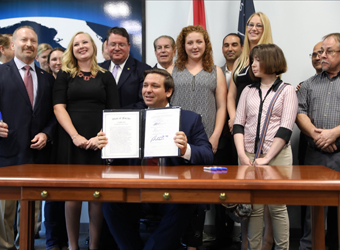 By Laurie Meggesin, FCAN’s Executive Director, and originally published on National College Access Network’s blog
By Laurie Meggesin, FCAN’s Executive Director, and originally published on National College Access Network’s blog
On Monday, Florida Gov. Ron DeSantis signed House Bill 7071 (HB 7071) into law, thereby sealing the state’s commitment to expanding education opportunities beyond high school to ensure all Floridians can thrive in the state’s dynamic workforce. Among the bill’s numerous provisions is one that the Florida College Access Network is particularly excited to support: a new postsecondary attainment goal for the state of Florida.
Recognizing that increasing Florida’s talent pipeline is vital for continued growth and economic prosperity, the SAIL to 60 Initiative (SAIL stands for “Strengthening Alignment between Industry and Learning”) sets an ambitious goal for the state to increase the percentage of Florida adults holding high-value postsecondary degrees, certificates, or training experiences to 60% by 2030. Currently, 49% of Floridians hold such credentials. The goal, which was championed by the Florida House of Representatives’ Higher Education and Career Readiness Subcommittee with unanimous support in both legislative chambers, will now serve as the North Star to guide Florida’s education policies and practices in the years ahead.
Additionally, HB 7071 calls on the Florida State Board of Education – which oversees the PK-12 system and the Florida College System – and the State University System of Florida Board of Governors to collaborate on several efforts to achieve this goal. This includes providing support and publicity for the efforts of the Florida College Access Network in developing public and private partnerships to:
- Increase the number of high school seniors who submit at least one postsecondary education application.
- Increase the number of high school seniors who submit a completed Free Application for Federal Student Aid (FAFSA) to receive financial aid to help pay for their postsecondary education expenses.
- Recognize and celebrate high school seniors for their postsecondary education and career plans and encourage early preparation for college.
- Conduct cross-sector regional meetings with postsecondary educational institutions, business leaders, and community organizations to solve community-specific issues related to attainment of postsecondary certificates, associate degrees, and baccalaureate degrees.
Several provisions in the bill provide a beginning roadmap for Florida to achieve the attainment goal. For example, the bill provides for awarding associate degrees through “reverse transfer” for students who earned at least 30 credits at a state college then transferred to a state university to earn a bachelor’s degree. It also calls for school district career and technical centers and Florida College System institutions to develop articulation agreements to create degree pathways for certificate earners, as well as to conduct annual reviews to ensure certificate offerings are aligned with current workforce demand. FCAN has been a proponent of such policies, as they reflect national best practices for ensuring credentials are high-value. The bill also expands apprenticeship opportunities through a competitive grant program.
Now that the bill is law, the next step is for the Florida Talent Development Council, a business-led and education-supported coalition of leaders, to develop a strategic plan by the end of 2019 to chart the course to achieve SAIL to 60. FCAN, together with the local college access networks that collectively represent over 80% of Florida’s population, stand ready to support the work of state leadership in developing this roadmap for Florida’s future.
With the new SAIL to 60 goal and such broad support from state and community leaders, Florida has the wind in its sails to create a brighter future for more students and families. With education, business, and community leaders throughout Florida working together, I feel confident that our state will achieve its goal. At FCAN, we are grateful to Gov. DeSantis and the Florida Legislature for their recognition of postsecondary education as an engine of economic mobility for all Floridians.
RELATED ARTICLES:
Florida adopts “Sail to 60” postsecondary attainment goal
2019 Florida Legislative Session Recap: Florida’s attainment goal and strengthened career pathways
